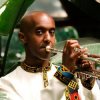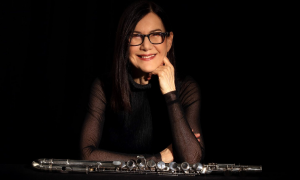Home » Jazz Articles » Interview » Billy Mohler: Emotions and Groove
Billy Mohler: Emotions and Groove

Courtesy Robbie Jeffers
For me, music resonates on an emotional level. ThatЎҜs why IЎҜm more interested in the personal and human aspects of the musicians I listen to, the stories they tell through their instruments, rather than their technical or innovative side. Innovation is always just a consequence of an artistЎҜs expressive needs.
—Billy Mohler, double bassist/composer
Billy Mohler
bassb.1975
All About Jazz: Let's start with The Eternal (Contagious Music, 2025), your latest album. After three excellent records with your quartet featuring

Chris Speed
saxophone
Shane Endsley
trumpet
Nate Wood
drumsb.1979
Billy Mohler: When I compose, I always start with bass lines. But after the initial spark, I move to the guitar to develop the composition further. The guitar has always played a central role in my writing, and I was sure that, sooner or later, this would lead me to create a group with a guitarist.

Jeff Parker
guitarb.1967

Damion Reid
drums
Devin Daniels
saxophone, altoAAJ: Was the change in lineup influenced by the fact that all the new band members are based in Los Angeles, like you?
BM: Yes and no. From a logistical standpoint, having everyone in LA makes sense for performances and recording sessions. But the decision was more about the personal and musical connection I have with these musicians. We've crossed paths in various groups, and I was confident the chemistry would be right between us, even though we had never all played together until the recording session.
AAJ: In recent years, the Los Angeles jazz scene has become increasingly vibrant. How would you describe it to someone who has never been there?
BM: The scene in LA is stronger than ever. The influx of musicians from across the country has brought a great deal of variety and has encouraged clubs to support new music.

David Binney
saxophone, altob.1961

Chris Speed
saxophoneAAJ: Many musicians have moved from New York or Chicago to Los Angeles in recent years. Do you think the Los Angeles scene has defining characteristics that distinguish it from those cities?
BM: LA has a really exciting free/improvised music scene right now. Perhaps audiences are becoming more engaged because they recognize they're witnessing an important moment in the evolution of this scene. I'm not exactly sure why, but I saw this shift firsthand at ETA, a venue that played a key role in this transformation. Initially, the bands playing there focused on standards or original compositions, and attendance was decent but not overwhelming. Then, when they started inviting groups that played more creatively—sometimes even free—the scene exploded, and the audience grew exponentially. Eventually, ETA was packed every night. I've lived in LA my whole life, and I had never seen anything like it. It's incredible.
AAJ: In your new band, the trumpet has been replaced by a harmonic instrument like the guitar. Has this changed your approach to composition and leading the band?
BM: Composition is still a mystery to me. I don't have a specific formula other than staying open to inspiration when it arrives. Once I've written a piece, my producer, Dan Seeff, and I work to determine the best instrumentation and arrangement for it.
AAJ: You recorded the new album with engineer Pete Min. His studio, Lucy's Meat Market, seems to be playing a crucial role in documenting forward-thinking bands in Los Angeles. What was it like working with him?
BM: Pete is fantastic! He's very open and has created an incredibly comfortable environment at his studio, which explains why so many musicians want to work with him.
AAJ: You've had extensive experience in the pop and rock world, working with artists like Smashing Pumpkins, Ringo Starr, Macy Gray, Nile Rodgers, Mavis Staples, Dolly Parton, and Lady Gaga. What have you brought back to jazz from these various experiences?
BM: All of these artists are completely dedicated to their artistic vision. Being around people with such conviction and determination is incredibly inspiring... you can't help but be affected by it.
AAJ: What do you remember most fondly from your time with The Calling and the success of "Wherever You Will Go?"
BM: The best part was traveling the world with my childhood best friend and drummer for The Calling,

Nate Wood
drumsb.1979
AAJ: Your passion for skateboarding led you to perform on Tony Hawk's Boom Boom Huck Jam tour. Can you tell us about that experience?
BM: The Boom Boom Huck Jam was a surreal experience on so many levels. Pat Hawk, Tony's sister, has been a longtime family friend—she was a background singer in my godfather's band, The Righteous Brothers. I grew up watching Bones Brigade movies and was even a shop-sponsored skater in high school, so skate culture is in my DNA. Some unforgettable moments of the tour include rehearsing on an Air Force base, having our own tour bus, and walking into a different arena every night to see the mega ramp set up for top skateboarders. I've always felt that skateboarding and improvised music tap into the same part of the brain, both require adapting and creating in real-time, responding to obstacles or sounds in the moment.
AAJ: Among your various roles—producer, composer, instrumentalist, bandleader—which gives you the greatest satisfaction?
BM: I love every aspect of being an artist and all the different roles involved in the creative process.
AAJ: You've mentioned that you compose starting from bass lines. Can you explain how this process works?
BM: I always start my compositions with a bass line, then I move to guitar to finish them. Occasionally, the melody arrives alongside the bass line. Songs usually emerge during practice sessions—I'll stumble upon a bass line, and from there, it's like following breadcrumbs down a path until I reach the final piece. It's still a mystery to me how songs come to life.
AAJ: What are your main sources of inspiration when composing?
BM: Life experiences, trauma, loss, happiness, and joy they all inspire me.
AAJ: Who are the double bassists that have influenced you the most?
BM:

Wilbur Ware
bass, acoustic1923 - 1979

Larry Gales
bass1936 - 1995

Ron Carter
bassb.1937

Eric Revis
bassb.1967

Ben Street
bass
Jimmy Garrison
bass, acoustic1934 - 1976

Tim Lefebvre
bassb.1968

Darek Oleszkiewicz
bass, acousticb.1963

Joe Sanders
bassb.1896

Larry Grenadier
bass, acousticb.1966
AAJ: In today's jazz scene, who do you think are the true innovators of the instrument?
BM: For me, music resonates on an emotional level. That's why I'm more interested in the personal and human aspects of the musicians I listen to, the stories they tell through their instruments, rather than their technical or innovative side. Innovation is always just a consequence of an artist's expressive needs.
AAJ: In April, you will embark on your first European tour. Have you written new material for the band? What are your expectations?
BM: Yes, I can't wait for the tour! We'll be performing music from my new album The Eternal, adapting it for the cordless quartet on tour, as well as material from my previous albums Focus! (MAKE Records, 2019) Anatomy (Contagious Music, 2022), and Ultraviolet (Contagious Music, 2023). I might even end up writing new music during the tour, inspired by our experiences. I'm really excited to perform in Italy and the Netherlands with this band! We'll be playing some of the best Italian clubs and stages, in Ferrara, Florence, Bolzano, Naples, Marostica, Ascoli Piceno, and we'll top it off playing one of the legendary European Clubs, the Bimhuis in Amsterdam. As I mentioned previously, Nate Wood and I have been making music together since we were kids, so for Nate to be on the tour (alongside Jeff Ballard for the first two shows) it's a dream come true! And I am really looking forward to playing with two incredible players, with a distinctive sound and personality like

Hermon Mehari
trumpetb.1987

Francesco Bigoni
saxophone, tenorb.1982
Tags
Interview
Billy Mohler
Ludovico Granvassu
The Eternal
Chris Speed
Shane Endsley
Nate Wood
Jeff Parker
Damion Reid
Devin Daniels
David Binney
WIlbur Ware
Larry Gales
Ron Carter
Eric Revis
Ben Street
Jimmy Garrison
Tim Lefebvre
Darek Oleszkiewicz
Joe Sanders
Larry Grenadier
Focus!
Ultraviolet
Hermon Mehari
Francesco Bigoni
Comments
PREVIOUS / NEXT
Support All About Jazz
 All About Jazz has been a pillar of jazz since 1995, championing it as an art form and, more importantly, supporting the musicians who make it. Our enduring commitment has made "AAJ" one of the most culturally important websites of its kind, read by hundreds of thousands of fans, musicians and industry figures every month.
All About Jazz has been a pillar of jazz since 1995, championing it as an art form and, more importantly, supporting the musicians who make it. Our enduring commitment has made "AAJ" one of the most culturally important websites of its kind, read by hundreds of thousands of fans, musicians and industry figures every month.
Go Ad Free!
To maintain our platform while developing new means to foster jazz discovery and connectivity, we need your help. You can become a sustaining member for as little as $20 and in return, we'll immediately hide those pesky ads plus provide access to future articles for a full year. This winning combination vastly improves your AAJ experience and allow us to vigorously build on the pioneering work we first started in 1995. So enjoy an ad-free AAJ experience and help us remain a positive beacon for jazz by making a donation today.

Los Angeles
Concert Guide | Venue Guide | Local Businesses
| More...









 Buy Now
Buy Now





















